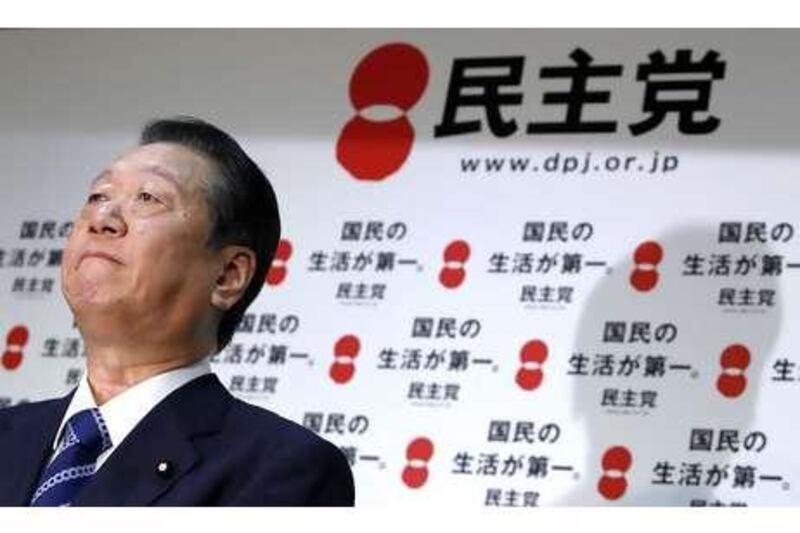Despite living under the risk of prosecution for dicey political contributions and suffering chronic heart problems, the former Democratic Party of Japan (DPJ) leader Ichiro Ozawa may have the votes to beat the Japanese prime minister Naoto Kan for the party leadership on September 14.
But with the yen still near 15-year highs even after additional central bank easing this week, it is perhaps the worst possible time to change leaders. The dollar rebounded to about ¥88.40 yesterday after Mr Ozawa said he would do everything possible, including intervention, to prevent the currency from strengthening. The firm yen, however, is merely a symptom of Japan's major problem - price deflation. Mr Ozawa has promised a ¥2 trillion (Dh86.95 billion) package to boost the Japanese economy, but that alone is unlikely to promote growth.
Many thought they had seen the end of him when he resigned as secretary general of the DPJ in June, and the dramatic turnaround highlights his genius in choreographing events. Mr Ozawa's puffy-eyed, heavy-jowled face is unpopular with a general public that has shown a visceral reaction to the possibility of him becoming their national leader. Opinion poll results from the business daily Nihon Keizai Shimbun published last Monday suggested while he topped Mr Kan in leadership abilities, nobody believed they could trust his character.
But Mr Ozawa knows democracy is a numbers game and he can count on the loyalty of some 150 of the 412 DPJ representatives with the biggest say at the coming poll. And in the topsy-turvy world of Japanese politics, Mr Ozawa is also supported by the former prime minister Yukio Hatoyama, who has grown rapidly disenchanted with Mr Kan after the upper house election defeat in July, and who may bring Mr Ozawa a further 50 votes. The pay-off is a probable seat in an Ozawa cabinet.
Until last week, the likelihood of an Ozawa government was so remote few analysts were able to provide any concrete ideas of what he might do as PM, but his repeated calls for the DPJ to stay faithful to its original election manifesto - which advocates a strong economy, strong finances and strong social security - provide a clue. Adhering to pledges to introduce a state subsidy for families with young children, continuing to make use of Japan's toll-based highways free on weekends, and introducing income support for rice farmers will stymie much-needed attempts to rebuild Japan's fiscal house.
Issuing deficit bonds is the only way to pay for these measures and although Japan largely funds its own debt - unlike Greece, Spain, or even the US - Mr Ozawa would shackle Japan's future generations with high repayments while driving up interest rates. Higher borrowing costs would hamper economic recovery prospects and any failure to pull back the yen would hurt smaller exporters and weigh on share prices.
Although likely to maintain security treaties with the US to counter the growing military influence of China in the region, and as a check on North Korean sabre rattling, Mr Ozawa's diplomacy can be fuzzy at best. Just last month, he called Americans "single-cell organisms", meaning "simplistic". The way he characterised Britons was potentially more problematic, when he said the way prisoners of war marched in orderly ranks in The Bridge on the River Kwai demonstrated the best qualities of the British.
Mr Ozawa suffered a heart attack in 1991 and has been known to withdraw from public business for periods of recuperation. That clouds his ability to handle the strains of the PM's job. He is also facing indictment by an official judicial review panel over allegedly falsified political funding reports, but the man who would be king has clearly done his homework. Article 75 of the Japanese constitution guarantees government ministers are not subject to legal action while in office without the consent of the prime minister.
So Mr Ozawa would effectively shield himself from prosecution by winning the premiership ? and that may be his ultimate reason for running. business@thenational.ae





